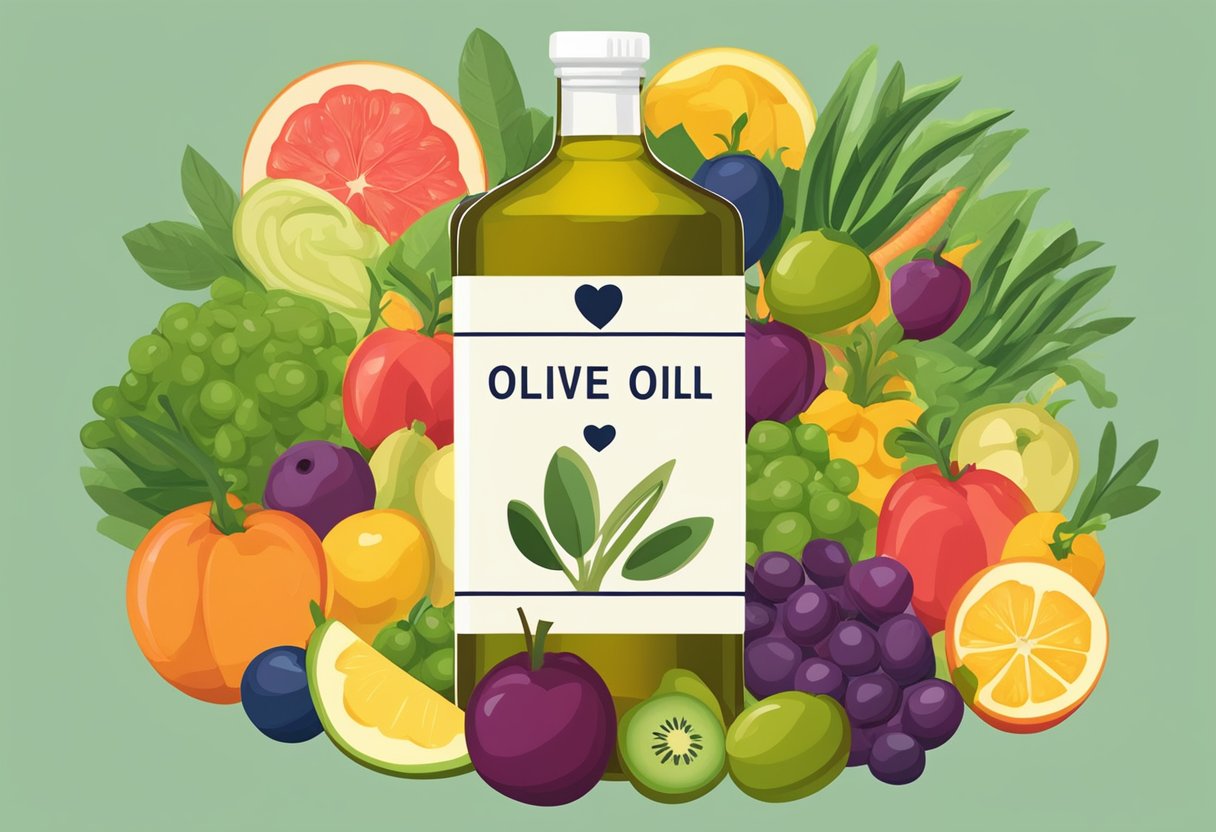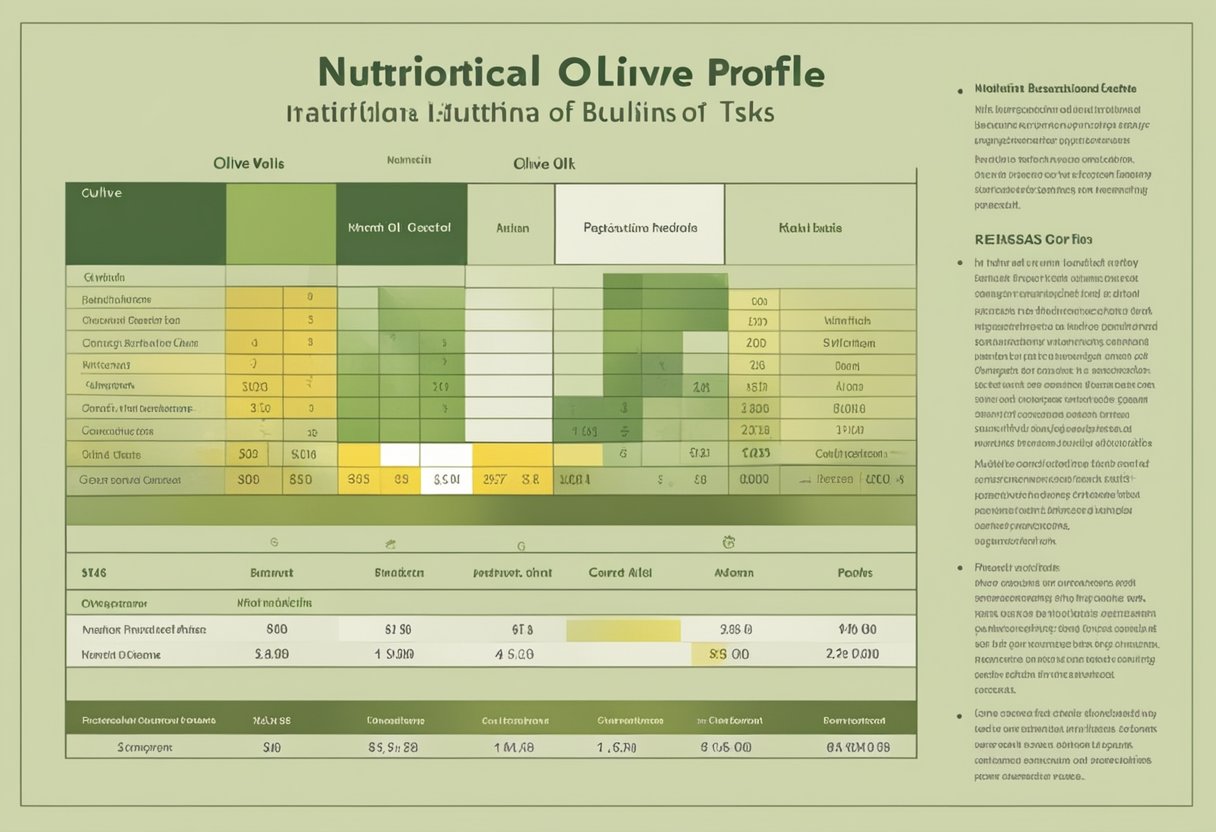Olive oil, a staple of the Mediterranean diet, has long been celebrated for its taste and health properties. Extracted from the fruit of the olive tree, it is a primary source of dietary fat in this eating pattern known for its potential benefits to health and longevity. As lifestyles and diets evolve, many people have become more attentive to their health, seeking ways to prevent diseases through nutrition.
Among the various dietary fats available, olive oil stands out for its nutritional value and has attracted the attention of researchers and health-conscious individuals alike.

The incorporation of olive oil into a gluten-free Mediterranean diet provides a heart-healthy boost, given its high content of monounsaturated fats and antioxidants. These components are associated with reducing the risk of chronic diseases, such as heart disease and cancer.
Current research suggests that regular consumption of olive oil may also play a role in lowering the risk of neurodegenerative diseases and contributing to overall longevity. As the scientific community continues to investigate the health implications of different dietary fats, olive oil remains a consistent focus due to its observed benefits across various health-related studies.
Key Takeaways
- Olive oil is recognized for its potential to lower disease risk when part of a gluten-free Mediterranean diet.
- Its high monounsaturated fat content may contribute to heart health and disease prevention.
- Continued research supports its role in a nutritious, health-promoting diet.
Table of Contents
Historical and Cultural Significance of Olive Oil
Olive oil has a deep-rooted history in Mediterranean culture, originating from the region known for the oldest olive trees. It’s considered one of the most valuable items in Europe’s culinary and health practices. Across history, it served more than just a dietary staple. The Mediterranean diet, celebrated for its health benefits, has always held olive oil in high esteem.
In ancient times, people used olive oil not only for cooking but also as a medium in:
- Lamps for lighting
- Medicine for its healing properties
- Personal grooming and cosmetics
The Mediterranean people have maintained olive groves for over 6,000 years. It signifies wealth, peace, and vitality in their society. Even today, olive oil is a symbol of their rich cultural heritage.
Today, this region still leads in olive oil production, sharing its treasured liquid with the world. The olive tree, botanical name Olea europaea, is more than a plant; it’s a historical icon encapsulating a way of life that values health, community, and connection to the land.
Nutritional Profile of Olive Oil

Olive oil is well-known for its healthy fats, mainly monounsaturated fatty acids (MUFAs), particularly oleic acid. These fats are considered good for heart health. Just one tablespoon of olive oil includes about 13.5 grams of fat, which provides roughly 119 calories. While it does contain a small amount of saturated fat, the majority of the fat in olive oil is the monounsaturated type.
Rich in antioxidants, olive oil contains a variety of phenolic compounds. These natural substances contribute to its stability and flavor, as well as its potential health benefits. Antioxidants play a key role in reducing the body’s oxidative stress, which can lead to cell damage.
The oil is also a source of polyphenols, a type of antioxidant that can help protect the body’s tissues against inflammation and may have a positive impact on cholesterol levels and other heart disease risks.
Here’s a brief overview of the nutritional components found in olive oil:
- Fat: Predominantly monounsaturated fats, with some saturated and polyunsaturated fats.
- Vitamins: Contains vitamin E and vitamin K, though in modest amounts.
- Calories: About 119 calories in a tablespoon (13.5 grams).
- Other nutrients: Includes trace amounts of minerals such as iron and calcium.
When incorporated into a gluten-free Mediterranean diet, olive oil serves as the primary source of dietary fat, aligning with the diet’s focus on plant-based foods, whole grains, and lean proteins. It is both a flavorful and nutritious addition to a healthy eating plan.
Olive Oil in the Mediterranean Diet
Olive oil is a key ingredient in the Mediterranean diet, which is famous for its health benefits. It is often used as a salad dressing or cooking oil. The type of olive oil most prized for health benefits is extra-virgin olive oil. The diet, rich in fruits, vegetables, legumes, and whole grains, emphasizes the use of olive oil instead of other fats.
Extra-virgin olive oil is made by pressing without heat or chemicals, which means it’s not just good for you but also has a great taste. People in Mediterranean countries consume it frequently, which may help them stay healthy. Scientists have found that olive oil can lower the risk of heart disease. It can also keep your body running smoothly by preventing other problems, like certain cancers.
Why Olive Oil?
- Taste: Olive oil adds a delicious flavor to food, especially when used in salad dressings or drizzled over dishes.
- Health: It’s packed with healthy fats that can help keep your heart strong.
How to Use It
- Drizzle it over salads or mix it into dressings.
- Use it in place of butter or margarine when cooking.
Some diets make it hard to find the right foods, but the Mediterranean diet with olive oil is pretty simple to follow and can even be gluten-free. Just choose gluten-free grains and other ingredients, and you can enjoy the healthy, tasty benefits of this eating style. Remember to pick high-quality extra-virgin olive oil for the biggest health boost.
Health Benefits of Olive Oil Consumption
Olive oil is a key component of the Mediterranean diet, known for its potential to reduce the risk of various diseases. Its rich composition of healthy fats and antioxidants plays a crucial role in maintaining good health.
Cardiovascular Health
Olive oil’s high levels of monounsaturated fats aid in maintaining healthy cholesterol levels, which is vital for heart health. Studies have shown that people consuming olive oil have a lower risk of heart disease death due to its ability to modulate blood pressure and improve endothelial function.
Cancer Prevention
The antioxidants in olive oil, such as oleocanthal, contribute to its cancer-prevention properties. These compounds help neutralize harmful free radicals, potentially reducing the risk of cancer development. Research suggests that high olive oil intake is associated with a lower risk of cancer death.
Neuroprotective Effects
Olive oil may protect the brain from neurodegenerative diseases. It is believed that the oil’s antioxidants support brain health, decreasing the risk of conditions like Alzheimer’s. A Harvard study suggests a link between olive oil consumption and reduced risk of neurodegenerative disease.
Longevity and Mortality
Incorporating olive oil into a diet can contribute to longevity. Its beneficial effects on cause-specific mortality are notable, with individuals who regularly consume olive oil experiencing a significant reduction in the risk of premature death, as highlighted by research from the Harvard T.H. Chan School of Public Health.
Metabolic Health
Those seeking to manage or prevent metabolic syndrome can benefit from olive oil. Its ability to help maintain a healthy weight and regulate blood sugar levels is critical for metabolic health.
Anti-inflammatory Properties
Chronic inflammation is a contributing factor in many diseases. Olive oil contains oleocanthal, which has similar anti-inflammatory properties to ibuprofen. By lowering inflammation markers like C-reactive protein, olive oil can help reduce the risk of various chronic conditions related to inflammation.
Comparative Analyses of Fats in Diet
In assessing the impact of fats on health, it’s crucial to compare how different types of fats, like olive oil, butter, and margarine, relate to disease risk.
Olive Oil vs. Butter and Margarine
Replacing butter or margarine with olive oil can influence health outcomes. Studies suggest that olive oil is a healthier choice as it contains monounsaturated fats, which are better for heart health. For instance, trading just 5 grams per day of butter with olive oil is linked with a reduced risk of heart disease.
Olive Oil and Other Vegetable Oils
While olive oil is a staple in the Mediterranean diet, other vegetable oils are also common in various cuisines. However, not all oils are created equal. Olive oil is particularly valued for its high content of antioxidants and beneficial fatty acids when compared to other vegetable oils.
Dairy Fat Replacement with Olive Oil
The substitution of dairy fat with olive oil could lead to favorable changes in a person’s risk profile for cardiovascular disease (CVD). One study showed that using olive oil instead of dairy fat like mayonnaise or certain dairy products could lower the risk of CVD by 5-7%.
Olive Oil in Cooking and Food Preparation
Olive oil is a key ingredient in the Mediterranean diet and is popular for its versatility in cooking and food preparation. It can be used in multiple ways, from sautéing vegetables to dressing salads. Its health benefits make it a favorite choice for those who follow a gluten-free and Mediterranean lifestyle.
Cooking with Olive Oil
When it comes to cooking, olive oil is a great option. It’s perfect for:
- Sautéing: Heats well and adds flavor
- Roasting: Helps create a delicious, crispy texture
- Baking: A healthier alternative to butter
One should choose the right type of olive oil for cooking — extra virgin olive oil is best for cold dishes or for adding at the end of cooking to maintain its flavor and nutrients.
Salad Dressing
For salads, olive oil is a staple. Its rich taste complements greens and vegetables perfectly. Here’s how to make a simple salad dressing:
- Whisk together 3 parts olive oil with 1 part vinegar or lemon juice.
- Add herbs and spices for extra flavor.
- Drizzle over your salad and toss before serving.
People who use olive oil in place of other fats like butter or mayonnaise may find they’re choosing a healthier option. Olive oil is rich in monounsaturated fats and has been associated with reducing the risk of heart disease.
Incorporating olive oil into daily cooking and salad-making is very easy and can contribute to a well-rounded, nutritious, gluten-free Mediterranean diet. They can be confident they’re adding valuable benefits to their meals, both in terms of health and taste.
Scientific Research and Health Data
Extensive studies and analyses provide robust evidence for olive oil’s role in reducing disease risk. These range from epidemiological surveys to controlled clinical trials.
Epidemiological Studies on Olive Oil
Researchers like Martinez-Gonzalez MA and Lopez-Miranda J have closely examined the dietary patterns of populations through health data gathered from dietary questionnaires. These studies highlight a link between the high consumption of olive oil, common in Mediterranean diets, and lower incidence of chronic diseases.
Meta-Analyses of Olive Oil Consumption
Meta-analysis involves pooling data from numerous studies to ascertain broader insights. Research by Ramirez-Tortosa MC and others in this domain suggests that higher olive oil intake correlates with reduced risks of cardiovascular disease and overall mortality. This cumulative analysis strengthens arguments for olive oil’s health benefits.
Clinical Trials Involving Olive Oil
Clinical trials, with their controlled environments, provide clear insights into olive oil’s health effects. Senior research scientists like Perez-Jimenez F and Visioli F lead these trials to explore the direct impact of olive oil consumption on human health. Their studies found olive oil to have positive effects on inflammatory markers and oxidative stress.
Recommendations for Olive Oil Intake

Incorporating olive oil into one’s diet is a simple yet effective step toward better health. Especially within the framework of a gluten-free Mediterranean diet, olive oil stands out for its health benefits. Here’s a guide to include this nutritious oil in daily meals:
- Daily Intake: Aiming for at least half a tablespoon (7 grams) of olive oil each day may help in disease prevention.
- Cooking with Olive Oil: Use it as the primary fat when cooking. Olive oil can be a healthy replacement for butter or vegetable oils that aren’t as heart-friendly.
- Salad Dressing: To enhance salads, whisk together olive oil, vinegar, and herbs. This dressing adds flavor without the gluten found in many commercial dressings
- Replacing Saturated Fats: For those aiming to eat a gluten-free Mediterranean diet, substitute olive oil for saturated fats like margarine, which can help in maintaining a healthier heart.
- Quality Matters: Opt for extra-virgin olive oil when possible, as it’s made from pure, cold-pressed olives and contains more of the beneficial antioxidants and nutrients.
Remember, while olive oil is healthy, it is also high in calories, so moderation is key. A balanced diet complemented with olive oil can aid in the prevention of various diseases and contribute to overall well-being.
The Future of Olive Oil Research

Research on olive oil and its health benefits is a growing field. Scientists are not only focusing on its current advantages but also how it might contribute to better health in the future. One particular area of interest is the role of olive oil in a gluten-free Mediterranean diet.
Researchers, including senior research scientists, aim to study olive oil’s effect on people with specific dietary needs. Given the popularity of gluten-free diets for health and lifestyle reasons, understanding how olive oil can reduce disease risks in these diets is important.
- The research will look at cardiovascular health.
- It will analyze anti-inflammatory properties.
- Cancer prevention will be a key focus.
Future studies may expand on the work presented at international conferences. These conferences bring together experts to share their findings and plan collaborative research.
Research teams plan to explore:
- Olive oil’s impact on long-term health in gluten-free diets.
- How different types of olive oil, such as extra virgin and virgin, affect health.
- The role olive oil plays in managing chronic diseases when combined with a gluten-free Mediterranean diet.
Upcoming research is essential for providing clear guidelines on how to incorporate olive oil into daily diets effectively. The hope is that these efforts will make a gluten-free Mediterranean diet even more beneficial for public health.
Frequently Asked Questions

Exploring the benefits of olive oil within the Mediterranean diet, these common questions address its role in disease prevention and overall health.
Can consuming olive oil improve heart health?
Consuming olive oil, particularly the extra-virgin variety, can enhance heart health. Its high content of monounsaturated fats helps to lower “bad” LDL cholesterol, which is linked to reducing the risk of heart disease.
What does recent research say about olive oil’s impact on diseases?
In the context of a Mediterranean diet, olive oil has been associated with a lower risk of chronic diseases such as heart disease, cancer, and neurodegenerative conditions.
How does olive oil contribute to the body’s anti-inflammatory response?
Olive oil contains antioxidants which aid in reducing inflammation. These compounds counteract oxidative stress and may play a role in lowering the incidence of diseases with an inflammatory basis.
What do experts say about olive oil as part of a cardiac-care diet?
Nutrition experts often recommend olive oil as a key ingredient of a cardiac-care diet, due to its potential in lowering cardiovascular mortality and improving heart health.
How can olive oil consumption benefit your immune system?
Olive oil has properties that can bolster the immune system. Polyphenols, found in olive oil, have been recognized for their role in supporting immune function and might protect against various illnesses.
What are the differences between olive oil types in reducing disease risk?
The type and quality of olive oil, ranging from extra virgin to refined, can impact its health benefits. Extra virgin olive oil typically has the highest levels of health-promoting compounds, which are influential in disease risk reduction.



